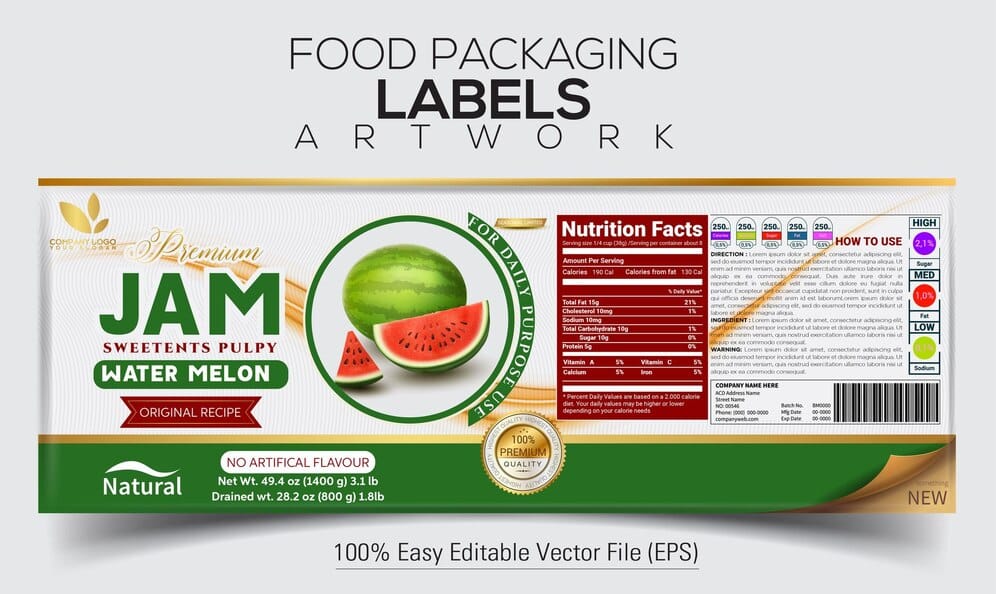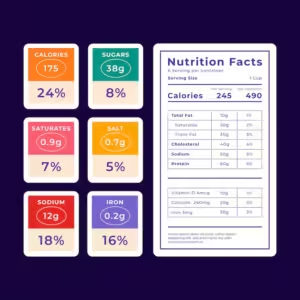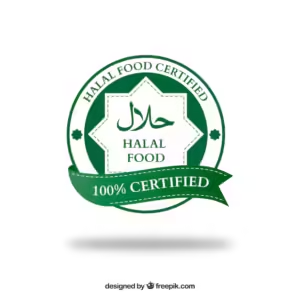
The food product label is an important and indispensable tool in the food industry, as it provides consumers with accurate and detailed information about the ingredients of products. This label is an essential guide that helps in making informed healthy decisions when purchasing food. The functions of the food label are multiple, including providing consumers with information about nutritional value, chemical content, and additives, as well as including information related to halal products.
In this article, we will discuss the importance of the food product label, how to put the correct information on it through specialized consultations, in addition to highlighting halal products and how to state them on the food label.
The importance of the food label
The food label is an essential tool in understanding the components of food and what the product contains of substances that may be beneficial or harmful. It gives the consumer the ability to:
1- Determine the nutritional value: by knowing the calories, proteins, fats, sugars, vitamins and minerals.
2- Monitor the ingredients: People with allergies or have certain food choices can avoid harmful or unwanted ingredients.
3-Making healthy decisions: Using the information on the food product label, the consumer can choose the products that suit his diet and health requirements.
The food product label is also a vital tool for consumers interested in knowing the contents of canned or packaged foods, thus contributing to increasing health awareness.
The importance of the information on the food label
The food product label includes very important information, including:
1-Ingredients: This is the first and most important thing that attracts the consumer’s attention. The ingredients are displayed in a descending order according to the quantity in the product, which helps in knowing the basic components contained in the meal.
2-Nutritional value: The card provides details about the amount of calories, protein, fat, carbohydrates, fiber, sugars, in addition to vitamins and minerals.
3-Information about additives: This includes preservatives, flavors, and artificial colors, which is information that is important for people who prefer to avoid chemicals or who suffer from allergies.
4-Health warnings: Such as warnings about certain contents that may cause allergic reactions or may be harmful to certain groups of people.
5- Expiry date: This definition helps the consumer know the validity of the product for use
The importance of transparency in the food label
One of the most important values that manufacturers must ensure is transparency in the information written on the food product label. The clearer and more accurate the information is, the more the consumer will trust the product and the manufacturer. Transparency is not limited to food ingredients and nutritional value, but also includes details about the manufacturing, supply, and packaging process. This helps strengthen the relationship between companies and consumers, as consumers feel reassured that they are getting a safe and reliable product. Companies that are committed to transparency in their food label information confirm their commitment to quality and public health.
The Impact of the Food Label on Public Health
Food labeling is an essential part of promoting the overall health of society. When consumers have accurate information about products, they can make better decisions about the food they eat. By monitoring ingredients, individuals with specific health conditions such as diabetes or heart disease can avoid foods that contain ingredients that may affect their health. For example, people who need to reduce their sodium or saturated fat intake can use food labels to make appropriate choices. Thus, these labels contribute to the prevention of diet-related diseases.
The Role of the Food Label in Product Marketing
Food labeling is a powerful marketing tool that can be used to differentiate products in the market. As consumers become more aware of the impact of foods on health, having a clear and standard-compliant food label has become crucial in determining their choice of products. Health certifications such as “organic,” “gluten-free,” or “halal” can differentiate products from their competitors and appeal to specific consumer groups. In other words, food labeling can be an influential factor in a marketing strategy, helping to build consumer confidence and enhance a company’s image in the market.
Challenges in Designing the Food Label
Despite the importance of food labels, their design can face some challenges that require specialized consultations to ensure their accuracy and efficiency. One of the most prominent of these challenges is updating information in line with changes in legal regulations or in the food ingredients themselves. Also, companies may face difficulty in simplifying information without losing essential details. Companies must ensure that the label is not limited to showing only the ingredients, but must be comprehensive enough to cover all necessary details, such as information related to health warnings. Having specialized consultants can help overcome these challenges and ensure the design of an effective and standards-compliant food label.
The role of consultants in facilitating compliance with laws and regulations
Through specialized consultations, manufacturers can easily adapt to the legislation and regulations that govern the food industry. Whether these regulations are local or international, consultants specialized in food labels provide the necessary guidance to ensure compliance. This requires that all information on the label complies with the laws of the country in which the product is sold, including the conditions for marketing and branding. Consultants also help review the label periodically to ensure that it is up to date with any updates in regulations that may affect nutritional information or labeling requirements on products.
The importance of consumer awareness about food labels
One important aspect to consider is the ongoing awareness of consumers on how to read and understand food labels. Many people may not have the knowledge to understand the symbols and terms that may appear on the label. This includes special diets, such as gluten-free or vegetarian diets. Therefore, companies should contribute to consumer awareness through awareness campaigns or publishing content explaining how to benefit from the information on the label. Having clear and simplified instructions on the label enhances consumers’ ability to choose products that suit their needs.
The role of consulting in providing correct information
Providing accurate and correct information on food labels is crucial to ensuring consumer safety. This is where specialized consulting in the food industry comes in. Consultants help ensure that all information on the label is correct and compliant with local and international regulations. Consultations in this area include:
1-Ensuring compliance with specifications: Consultants review the product’s ingredients and their compliance with specified food standards.
2-Reviewing food labels: Ensuring the clarity and accuracy of the information presented on the card.
3-Compliance with legislation: Companies are directed to ensure compliance with local and international standards and laws related to food labels.
The presence of specialized consultants helps protect companies from any errors that may affect their reputation and cause harm to consumers.
Halal products and how to indicate them on the food label
Halal products are one of the food categories that are gaining increasing interest in many markets around the world. The food product label is used to indicate whether the product is halal or not, which is done by including the “Halal” logo or texts related to the product’s compliance with Islamic law.
In this context, manufacturers are required to clearly state on the food label:
1-Halal ingredients: which must be free of any substances prohibited by Islamic law such as non-halal meat or alcohol.
2-Halal Certifications: Some companies include certifications from recognized bodies to ensure that the products are approved as halal.
3-Preparation and manufacturing methods: It should be explained how the product was manufactured to ensure that it complies with halal standards, such as using manufacturing tools that are not contaminated with non-halal products.
Including this information helps consumers who follow a halal diet make informed decisions when purchasing products.
In conclusion, there is no doubt that the food product label is a vital tool in making sound nutritional decisions, and is considered one of the essential factors that help consumers choose foods that suit their health needs. Through specialized consultations in the food industry, the accuracy of the information included on the label can be ensured, which enhances consumer confidence in the products.
If you are interested in obtaining accurate advice regarding the status of food product labels, or if you need assistance in ensuring compliance with health and halal standards, ProNano Food Industry Consulting Company provides you with specialized advice in this field. Do not hesitate to contact us for professional and accurate advice to ensure the quality of your food products.



